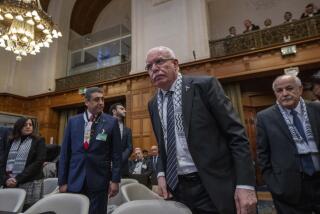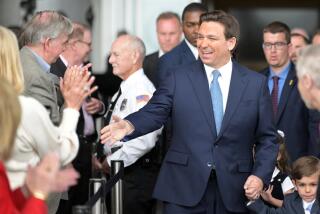Annan Calls U.S.-Led Invasion of Iraq Illegal
- Share via
UNITED NATIONS — Secretary-General Kofi Annan said that he thought the invasion of Iraq was illegal, prompting quick rebuttals from the United States and its allies in the war.
Pressed repeatedly in a Wednesday interview with the BBC on whether the U.S.-led invasion of Iraq was illegal, Annan finally said, “Yes, if you wish.” He added, “I have indicated it is not in conformity with the U.N. Charter. From our point of view and from the charter point of view it was illegal.”
It was the first time Annan had spoken so plainly on the war, choosing on other occasions to couch his opposition in more diplomatic terms. But though Annan changed his language, he has not changed his position, said his spokesman, Fred Eckhard. “He feels it’s no different from what he’s been saying for more than a year, and that position is very well known to member governments,” he said.
In several speeches, Annan had said he thought the attack on Iraq violated the U.N. Charter and that the action should not have been taken without Security Council approval. But he has always used the phrase “not in conformity with the U.N. Charter” to convey illegality.
The interview also comes on the eve of the meeting of the General Assembly, when more than a hundred government leaders convene at the U.N. Though Annan did not intend to renew the debate over Iraq, his remarks may color discussions next week as President Bush pushes other countries to help shore up the troubled country.
Bush did not directly address Annan’s comments during a campaign swing through Minnesota, but noted the Security Council’s unanimous adoption in November 2002 of a resolution warning of “serious consequences” if Iraq did not disarm or account for missing weapons materials. The U.S. withdrew a second resolution seeking council approval of military action just before launching the invasion.
“I believe when bodies say something, they better mean it,” Bush said.
A former advisor to Defense Secretary Donald H. Rumsfeld charged that Annan’s comments were intended to influence the U.S. presidential election.
“To do this 51 days before an American election reeks of political interference,” the advisor, Randy Scheunemann, told the BBC.
At U.N. headquarters, U.S. Ambassador John C. Danforth said he had “very high regard” for Annan. But he added, “I would have advised him not to say it at all, and if he was going to say it at all, not to say it now.”
Officials in Washington, Britain and Australia insisted that their military action against Iraq was legal and approved by the Security Council. It is election season in two of the countries, and involvement in Iraq has become even more politically charged.
In Britain, Prime Minister Tony Blair’s office said the attorney general, Lord Goldsmith, had ruled that Britain had a legal basis to use military action, citing three U.N. resolutions that justified the use of force against President Saddam Hussein’s government.
Australian Prime Minister John Howard said the invasion was “entirely legal” and that the Security Council was too often “paralyzed” by its need for consensus among members. Australia will hold parliamentary elections Oct. 9, and Howard’s staunch backing of military action has been a contentious issue in the face of widespread popular opposition to it.
“The body is paralyzed,” Howard said. “It is not doing much, and the reason is you can’t get agreement among the major powers.”
The wrangle over how to deal with Iraq’s failure to catalog its weapons programs was, for Annan, one of the most difficult chapters of his tenure at the United Nations. Despite the Security Council’s division over whether to invade Iraq, it unanimously endorsed the U.S.-led occupation of Iraq after the war, and called for a “leading role” for the U.N. in the country’s reconstruction. The U.N. has since helped create an interim government there and is now involved in preparing elections and a constitution.
But to Annan, the preemptive action called into question the charter’s principles on the use of self-defense. Annan created a high-level panel last year to clarify the rules of collective security in hopes of avoiding a repeat of the damaging standoff over Iraq. The panel will release its report at the end of this year.
In the interview, Annan said that the last year had been one of “painful lessons.” “I hope we do not see another Iraq-type operation for a long time -- without U.N. approval and much broader support from the international community,” he told the BBC.
More to Read
Sign up for Essential California
The most important California stories and recommendations in your inbox every morning.
You may occasionally receive promotional content from the Los Angeles Times.













